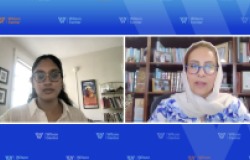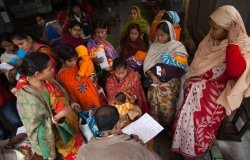POSTPONED: Fighting Non-Communicable Diseases to Improve Maternal Health
This event has been postponed.
Overview
Under Millennium Development Goal 5, countries around the world committed to reducing maternal mortality by 75 percent between 1990 and 2015. In those 25 years, maternal deaths have dropped 45 percent globally, but improvement has lagged in African countries. Among the factors holding back further progress are complications from non-communicable diseases (gestational diabetes, hypertension, obesity, etc.). Nearly 30 percent of maternal deaths are linked to these indirect causes. Despite their importance, key policy and strategy documents of leading government, non-government, and UN organizations often leave out mention of the role of non-communicable diseases. This event will look at how governments, civil society, and the private sector in low- and middle-income countries are looking at non-communicable diseases with a focus on gestational diabetes to address maternal mortality and morbidity through health policies, program implementation, new local practices, and integrated service delivery.
Want to attend but can’t? Tune into the live or archived webcast at WilsonCenter.org. Archived webcasts go up approximately one day after the meeting date.
Join the conversation on Twitter by following @NewSecurityBeat and find related coverage on our blog at NewSecurityBeat.org.
Media guests, including TV crews, are welcome and should RSVP directly to Francesca.Cameron@wilsoncenter.org. Media bringing heavy electronics MUST indicate this in their response so they may be cleared through our building security and allowed entrance. Please err toward responding if you would like to attend.
RELATED CONTENT:
· For Maternal Health, What Role Will Universal Health Coverage Play in a Post-MDG World?
Hosted By

Maternal Health Initiative
Life and health are the most basic human rights, yet disparities between and within countries continue to grow. No single solution or institution can address the variety of health concerns the world faces. By leveraging, building on, and coordinating the Wilson Center’s strong regional and cross-cutting programming, the Maternal Health Initiative (MHI) promotes dialogue and understanding among practitioners, scholars, community leaders, and policymakers. Read more

Global Risk and Resilience Program
The Global Risk and Resilience Program (GRRP) seeks to support the development of inclusive, resilient networks in local communities facing global change. By providing a platform for sharing lessons, mapping knowledge, and linking people and ideas, GRRP and its affiliated programs empower policymakers, practitioners, and community members to participate in the global dialogue on sustainability and resilience. Empowered communities are better able to develop flexible, diverse, and equitable networks of resilience that can improve their health, preserve their natural resources, and build peace between people in a changing world. Read more
Thank you for your interest in this event. Please send any feedback or questions to our Events staff.









